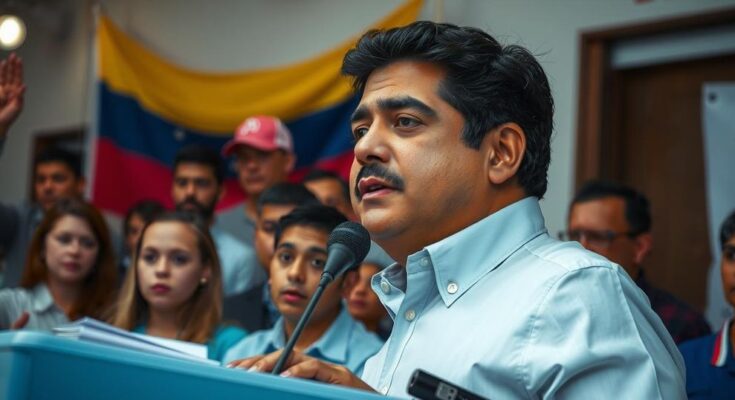Nicolás Maduro is set to start his third term amid allegations of election fraud, with significant doubts about the legitimacy of the July 28 election. The opposition claims a rightful victory for Edmundo González, while Maduro’s government tightens its grip amidst a crackdown on dissent. Diplomatic relations with the U.S. under an incoming Trump administration pose further queries regarding future actions toward Venezuela, which continues to face severe humanitarian crises.
Nicolás Maduro is set to commence his third presidential term in Venezuela on January 10, despite significant doubts regarding the legitimacy of the July 28 election that led to his claimed victory. Critics, including the U.S.-based Carter Center, assert that opposition candidate Edmundo González actually won the election, casting a shadow over Maduro’s ceremonial swearing-in by the ruling party-controlled congress. This moment marks a continuation of policies detrimental to the Venezuelan populace, characterized by rampant inflation and systemic corruption.
As the inauguration approaches, opposition groups have called for mass protests. However, the government’s violent crackdown post-election, which resulted in over 2,000 arrests, has created an intimidating atmosphere likely to dissuade potential demonstrators. Opposition leader María Corina Machado is gearing up to re-enter public life, aiming to galvanize resistance against Maduro, who continues to face international condemnation for his authoritarian governance.
Edmundo González, acknowledged by the U.S. as the true election victor, is actively campaigning abroad after fleeing Venezuela amid threats to his safety. His recent meeting with President Biden highlighted international support for Venezuela’s opposition, although Maduro remains defiant, intensifying efforts to detain González.
With the prospect of a second Trump administration on the horizon, it is unclear how relations with Maduro may evolve. Trump previously maintained a hardline stance against him, and while there are indications of Maduro reaching out for diplomatic engagement, experts caution that any negotiations must prioritize Venezuelan freedom.
Overall, Maduro’s impending inauguration amid alleged election fraud illustrates the ongoing turmoil in Venezuela, sparking critical international discourse regarding the future of democracy in the nation.
The political climate in Venezuela has been fraught with tension, particularly surrounding elections conducted under Nicolás Maduro’s regime. Maduro, who has been in power for over a decade, faces significant opposition both domestically and internationally. Past elections have been marked by allegations of manipulation and unfair practices, leading to widespread skepticism about the legitimacy of those outcomes. The U.S. and other nations have expressed support for opposition leaders, asserting the need for democratic reform in Venezuela. The situation took a serious turn with the recent election held on July 28, 2022, which was ostensibly marked by irregularities, and resulted in Maduro’s declared victory amid accusations from the opposition and international observers of the electoral process being rigged. Amidst calls for protests, the severe crackdown by the government on dissent has further escalated the political crisis, illuminating the struggle for power in a nation plagued by economic collapse. Amidst these tensions, discussions in the U.S. about policy towards Venezuela have gained renewed urgency, with the incoming administration needing to navigate the complex dynamics of supporting democracy while addressing migration issues resulting from the turmoil in Venezuela.
In conclusion, Nicolás Maduro’s upcoming swearing-in for a third term illustrates the enduring challenges facing democracy in Venezuela. The legitimacy of the electoral process remains a contentious issue, with substantial evidence suggesting that opposition leader Edmundo González actually emerged victorious. As international attention focuses on Venezuela, the potential for diplomatic engagement under a new U.S. administration remains a critical aspect to monitor.
Original Source: www.foxnews.com




